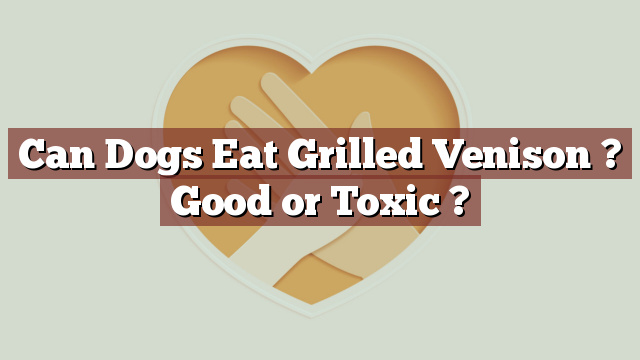Can Dogs Eat Grilled Venison? Good or Toxic?
Ensuring the safety of the food we offer our beloved pets is paramount for their well-being. Being aware of what foods are safe and potentially harmful for our furry friends is crucial to their overall health. One popular food that may arise questions among dog owners is grilled venison. In this article, we will delve into the nutritional value of grilled venison for dogs, determine if it is safe or toxic for them, explore potential risks and benefits, and provide guidance on what to do if your dog consumes grilled venison.
Nutritional Value of Grilled Venison for Dogs
Grilled venison, also known as deer meat, is a lean source of protein that is rich in essential amino acids. It contains vitamins such as B12, B6, and riboflavin, as well as minerals like iron, zinc, and selenium. Additionally, venison is relatively low in fat content compared to other meats, making it a potentially beneficial option for dogs with certain dietary needs. However, it is crucial to remember that each dog is unique, and their individual nutritional requirements should always be considered.
Is Grilled Venison Safe or Toxic for Dogs?
Can dogs eat grilled venison? The answer is yes, dogs can safely consume grilled venison. In fact, venison is often included in commercially available dog foods due to its nutritional benefits. However, it is important to note that the preparation and seasoning of the venison can significantly impact its safety for dogs. Plain, unseasoned grilled venison is generally safe for them, but it is essential to avoid using any harmful spices, excessive salt, or other seasonings that may be toxic to dogs. Furthermore, it is crucial to ensure the meat is thoroughly cooked, as undercooked venison can pose a risk of bacterial contamination.
Potential Risks and Benefits of Dogs Eating Grilled Venison
While grilled venison can provide numerous health benefits for dogs, there are also potential risks associated with its consumption. One primary concern is the potential for foodborne illnesses, such as Salmonella or E. coli, which can be present in raw or undercooked meat. Another aspect to consider is the possibility of allergies or sensitivities in some dogs, as venison may not agree with all canines. If your dog has not consumed venison before, it is advisable to introduce it gradually and monitor for any adverse reactions.
On the other hand, the nutritional benefits of grilled venison can be advantageous for dogs. Its high protein content assists in muscle development and maintenance, while the low fat content makes it suitable for canines with weight management needs. Additionally, the presence of essential vitamins and minerals contributes to overall well-being and can support a healthy immune system.
What to Do If Your Dog Eats Grilled Venison
If your dog consumes grilled venison, there are a few steps you can take to ensure their safety and well-being. First, assess the quantity ingested and observe your dog for any immediate signs of illness or discomfort. If your dog shows any concerning symptoms, such as vomiting, diarrhea, or lethargy, it is crucial to contact your veterinarian promptly. They will provide the best guidance based on your dog’s specific situation and may recommend bringing them in for an examination.
Conclusion: Should Dogs Eat Grilled Venison?
In conclusion, dogs can safely consume grilled venison as part of a well-balanced diet. The nutritional value it offers, such as lean protein and essential vitamins and minerals, can be beneficial for their overall health. However, it is essential to ensure that the venison is properly cooked, free from harmful seasonings, and introduced gradually to monitor for any adverse reactions. As always, if you have any concerns or questions about your dog’s diet, it is best to consult with your veterinarian for personalized advice.
Thank you for investing your time in exploring [page_title] on Can-Eat.org. Our goal is to provide readers like you with thorough and reliable information about various dietary topics. Each article, including [page_title], stems from diligent research and a passion for understanding the nuances of our food choices. We believe that knowledge is a vital step towards making informed and healthy decisions. However, while "[page_title]" sheds light on its specific topic, it's crucial to remember that everyone's body reacts differently to foods and dietary changes. What might be beneficial for one person could have different effects on another. Before you consider integrating suggestions or insights from "[page_title]" into your diet, it's always wise to consult with a nutritionist or healthcare professional. Their specialized knowledge ensures that you're making choices best suited to your individual health needs. As you navigate [page_title], be mindful of potential allergies, intolerances, or unique dietary requirements you may have. No singular article can capture the vast diversity of human health, and individualized guidance is invaluable. The content provided in [page_title] serves as a general guide. It is not, by any means, a substitute for personalized medical or nutritional advice. Your health should always be the top priority, and professional guidance is the best path forward. In your journey towards a balanced and nutritious lifestyle, we hope that [page_title] serves as a helpful stepping stone. Remember, informed decisions lead to healthier outcomes. Thank you for trusting Can-Eat.org. Continue exploring, learning, and prioritizing your health. Cheers to a well-informed and healthier future!

